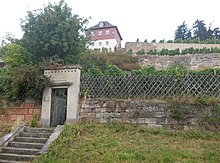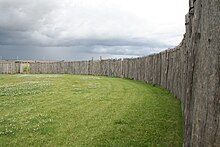Naumburg is a town in southern Saxony-Anhalt, perhaps best known for its cathedral, which was inscribed on the UNESCO World Heritage List in 2018.

The nearby district Bad Kösen is a sanatorium and saline bath. The district Schulpforte hosts the former monastery Pforta (German: Kloster Pforta) including the boarding school Landesschule Pforta.
Understand
[edit]
Naumburg used to be a historical centre with its cathedral, old city and the proximity to the old Via Regia, and the several castles around, e.g. Neuenburg and Rudelsburg. Later on in the 20th century, it hosted a large number of soldiers in its garrison. After reunification, the population declined from 50,000 to below 35,000 inhabitants. Nowadays, tourism is receiving more focus in the area. Naumburg is the vine area of Saale-Unstrut, the smallest vine area of Germany. However, Naumburg is not a university city, so don't expect too many people to speak English.
Get in
[edit]By plane
[edit]The closest airport is Leipzig/Halle Airport (LEJ IATA), sometimes called Schkeuditz Airport, 22 km northwest of central Leipzig. Trains run between the airport and Leipzig Hbf every 30 minutes; the trip takes 14 or 18 minutes and costs €4.20. Then you change to a train to Naumburg, which is connected to the Leipzig railway network. When arriving at the main station from the airport you have to go up the stairs for connecting services.
By car
[edit]A9, running from Munich to Berlin, has an exit marked "Naumburg"; however, it is still 15 km to the city centre.
By train
[edit]1 Naumburg (Saale) Hbf (about 1.8 km north-west of the center). The main train station.
Since the completion of the Leipzig/Halle–Erfurt high-speed route that bypasses Naumburg, intercity trains only call a few times per day: There is one ICE high-speed train from Hamburg (4 hr) and Berlin (2 hr) in the evening and regular intercity trains from Düsseldorf (5½ hr) via Kassel (2 hr 15 min) and from Stuttgart (5½ hr) via Nuremberg (3 hr), each 1–2 times a day.
Otherwise, you will have to change from intercity to regional trains in Halle, Erfurt or Leipzig. From each of these cities there is hourly service with "regional express" trains, taking between 35 (Halle) and 50 minutes (Leipzig).
Get around
[edit]2 Naumburger Straßenbahn (Line 4). The tram runs every 30 minutes from the Hauptbahnhof, taking 11 minutes to run half-way around the city centre (single trip €2; tickets sold on the tram). The tram line uses historic vehicles built in Gotha between the 1950s and 1970s. If you are lucky, you might be able to ride on tram 17, built in 1928. At only 2.5 km (1.6 mi) long, this metre-gauge line is the smallest urban tramway in Germany, and one of the smallest in Europe.
All the inner city is in walkable distance. For trips to nearby Freyburg, Schulpforte or Bad Kösen try to catch a bus or more comfortable a taxi; if you are fit, a bicycle also does it.
See
[edit]
- 1 St. Peter and Paul Cathedral Naumburg (Naumburger Dom), Domplatz 16 (old city), ☏ +49 3445 2301-120, fuehrung@naumburger-dom.de. March-October: M-Sa 09:00-16:00, Su holidays 11:00-18:00; November-February: M-Sa 10:00-16:00, Su holidays 12:00-16:00. Naumburg Cathedral is one of the major cathedrals of the Central European Middle Ages and a top attraction on the "Romanesque Street" in Saxony-Anhalt. The unique pieces of art in the western choir, the donator characters/Stifterfiguren show margravine Uta, one of the "most beautiful women of medieval times" and her anonymous creator, the "Master of Naumburg". Furthermore you can find the oldest stone sculpture of Saint Elisabeth of Thuringia, modern windows created by Neo Rauch with scenes from her live, and wings of the altar designed by Lucas Cranach. Adults €7.50, students €5.50, pupils €3.

- 2 Nietzsche House, Weingarten 18, ☏ +49 3445 201638. Tu-F 14:00-17:00, Sa Su and holidays 10:00-17:00. The house in which the famous philosopher Friedrich Nietzsche spent his childhood and youth. Today it holds an exhibition about his life and work. Adult €3, reduced €2; groups (min 10 persons): €2 per person, guided tours: additional €25 (only upon prior registration).
- 3 Kloster Pforta (Landesschule Pforta), Schulstraße 22, 06628 Naumburg OT Schulpforte (4 km west of the town centre, on the road to Bad Kösen), ☏ +49 3643 418888. See the boarding school of famous alumni portense: poet Friedrich Gottlieb Klopstock (1724 - 1803), philosopher Johann Gottlieb (1762 - 1814), mathematician August Ferdinand Möbius (1790 - 1868), historian Leopold von Ranke (1795 - 1886), Egyptologue Richard Lepsius (1810 - 1884) or philosopher Friedrich Nietzsche (1844 - 1900). It has been a boarding school with humanistic origins since 1543. Now, a boarding home for 300 pupils from all over Germany and subsidized by the state Saxony-Anhalt. Several German movies like "Das Fliegende Klassenzimmer" were shot there. See the church of the monastery, the nice park behind and stroll through connected building of the school, but don't try to open doors. There will be classes going on. free.

- 4 Großjenaer Blütengrund ("flower ground") (3.5 km north of the town centre). Beautiful landscape right at the confluence of rivers Saale and Unstrut, with a small ferry (only for pedestrians and bicycles) powered by the natural flow energy of the river, vineyards, Baroque rock reliefs depicting scenes from the Bible called the "stone picture book", and the villa of the artist Max Klinger, who described this area as a "Toscana of the North". There is a campsite and kayak/canoe jetty and rental.
Do
[edit]- Bicycle tour. Rent bicycles and take a tour along the Saale to Schönburg (5 km) or Bad Kösen (7 km) via Schulpforte or along the Unstrut to Freyburg (9 km).
- Canoe tour. Rent a canoe or kayak and paddle down the Saale.
- Wine tasting. It's a wine region. Many vinegrowers offer tastings, some include food.
- Weinmeile (starting point: either Rossbach or Bad Kösen). Saturday & Sunday. literally translates as "wine mile", a local festival on the Pentecost weekend (50 days after Easter). Along the 5km track between Bad Kösen and Rossbach around 40 winegrowers open their yards and sell food and wine. There is plenty of opportunity to discover all different varities of Saale-Unstrut wines. There is also a shuttle bus between the two starting points and train connections run from Naumburg.
- Geo-Nature Park Saale-Unstrut-Triasland. This nature park encompasses the entire Saale-Unstrut region. An instructive vineyard, the Herzoglicher Weinberg (Duke’s Vineyard) near Freyburg, is also operated by the park.
Nearby
[edit]- 1 Rotkäppchen Sektkellerei, Sektkellereistraße 5, 06632 Freyburg, ☏ +49 34464 340. Well-known sparkling wine producer in Germany. Offers tours and tastings.
Buy
[edit]
By local wines from the Saale-Unstrut region.
- 1 Landesweingut Kloster Pforta (Vinothek Schulpforte), Schulstraße 12, 06628 Naumburg OT Schulpforte (gatehouse of the Landesschule Pforta), ☏ +49 34463 26121, service@kloster-pforta.de. Daily 10:00-18:00. The most renowned wine producer.
Eat
[edit]- 1 Ratskeller, Markt 1 (on market square in old town), ☏ +49 3445-26 16 397. Daily from 11:30. Serves typical German food. They also brew their own beer. meals: €8-20.
- Gasthof Zufriedenheit, Steinweg 26/27, ☏ +49 15233882745, office@gasthof-zufriedenheit.de. This restaurant and wine bar professes to serve "contemporary fare with a regional accent".
Drink
[edit]- 1 Altstadt Köpi, Engelgasse 1, ☏ +493445230943. Daily 18:00 - late. local bar, try B52 shot
Sleep
[edit]- 1 Hotel Stadt Aachen, Markt 11, ☏ +49 3445 261060.
- 2 Hotel Stadt Naumburg, Friedensstraße 6, ☏ +49 3445 7390.
- 3 Center Hotel Kaiserhof, Bahnhofstraße 35-37, ☏ +49 3445 2440.
- Hotel Gasthof Zufriedenheit, Steinweg 26, ☏ +49 3445-791 20 51, info@gasthof-zufriedenheit.de.
Connect
[edit]Nearby
[edit]


- Bad Kösen, 7 km west, brine well and health resort
- Rudelsburg, 11 km southwest (another 4 km from Bad Kösen), romantic ruined castle from the 12th century, considered one of the most beautiful castles on the Saale and was idealised by artists and poets. Just across a valley is the similar Saaleck Castle.
- Goseck, 9 km northeast, neolithic circular enclosure with a reconstructed wooden pallisade, that was probably used as an early solar observatory and calendar, sometimes compared to Stonehenge. Moreover there is a medieval castle-turned-monastery.
- Freyburg, 10 km north, is the heartland of the Saale-Unstrut wine region, home to the Rotkäppchen sparkling wine factory incl. museum and the home city of "Turnvater" Friedrich Ludwig Jahn, who made gymnastics and sports popular in the 19th century. Another sight is the high-medieval Neuenburg Castle on a hilltop above the town. Naumburg and Freyburg are linked by the Unstrut cycle path.
- Eckartsburg in Eckarstsberga, 20 km west, well-preserved Romanesque hilltop castle
- Nebra Ark Visitor Centre, 33 km northwest, finding place of the precious bronze sky disk from 3000 BC. On the Unstrut cycle trail beyond Freyburg.
- Memleben, 35 km northwest (another 5 km from Nebra), early medieval power center, the site of the lost imperial palace is yet to be identified, the remains of the monumental Romanesque abbey can however be visited as well as a museum informing about the history of the place.
Go next
[edit]- Merseburg, 30 km north, more than thousand-year-old town with interesting old centre, Romanesque/Gothic cathedral and Renaissance palace (c. 25 minutes by train)
- Jena, 33 km south, university city and research centre, picturesque old town and modern high-tech industries (half hour by train)
- Weimar, 50 km southwest, Germany's "classical city", where several poets, philosophers and artists of the classical era lived and worked, is half an hour away by train.
- Halle, about 50 km north. Has some great things to see. Largest city in Saxony-Anhalt, birthplace of George Frideric Handel and has a few castles (35–40 minutes by train).
- Leipzig, 60 km northeast, trade city and cultural metropolis, "boom town" of Eastern Germany (45–50 minutes by train).
- Erfurt, 75 km southwest, state capital of Thuringia, medieval old city (45–50 minutes by train).

